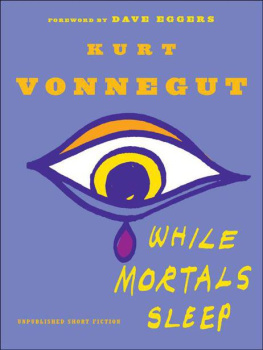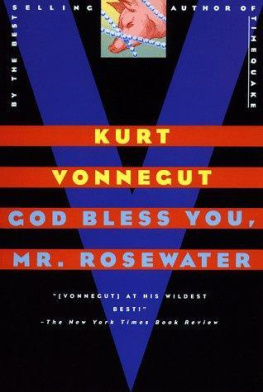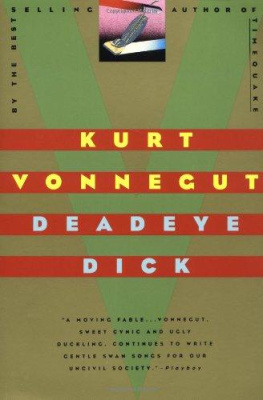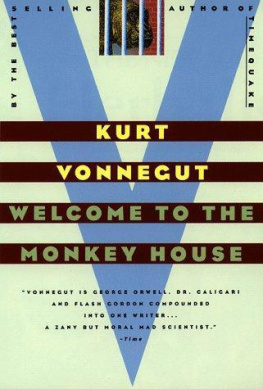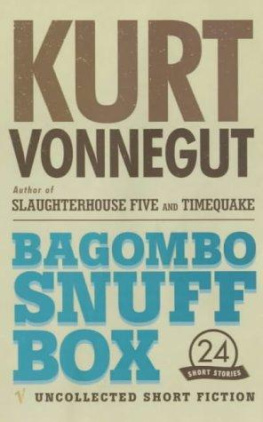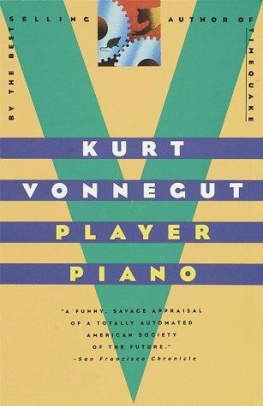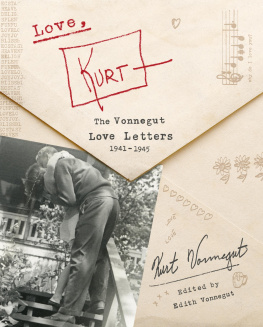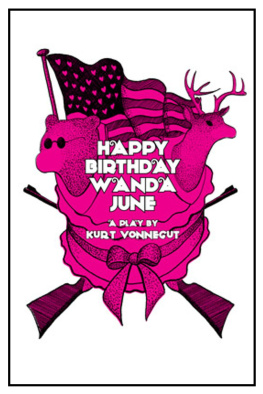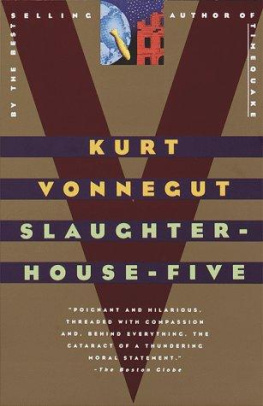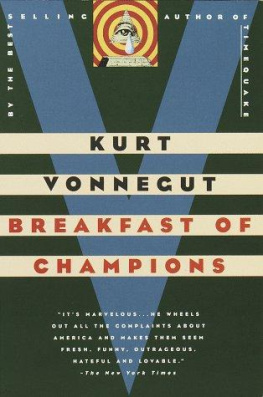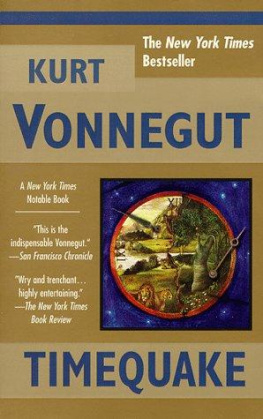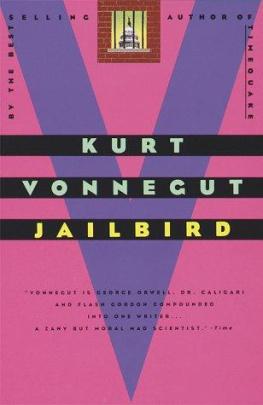Kurt Vonnegut - While Mortals Sleep: Unpublished Short Fiction
Here you can read online Kurt Vonnegut - While Mortals Sleep: Unpublished Short Fiction full text of the book (entire story) in english for free. Download pdf and epub, get meaning, cover and reviews about this ebook. year: 2011, publisher: Delacorte Press, genre: Detective and thriller. Description of the work, (preface) as well as reviews are available. Best literature library LitArk.com created for fans of good reading and offers a wide selection of genres:
Romance novel
Science fiction
Adventure
Detective
Science
History
Home and family
Prose
Art
Politics
Computer
Non-fiction
Religion
Business
Children
Humor
Choose a favorite category and find really read worthwhile books. Enjoy immersion in the world of imagination, feel the emotions of the characters or learn something new for yourself, make an fascinating discovery.
- Book:While Mortals Sleep: Unpublished Short Fiction
- Author:
- Publisher:Delacorte Press
- Genre:
- Year:2011
- Rating:5 / 5
- Favourites:Add to favourites
- Your mark:
- 100
- 1
- 2
- 3
- 4
- 5
While Mortals Sleep: Unpublished Short Fiction: summary, description and annotation
We offer to read an annotation, description, summary or preface (depends on what the author of the book "While Mortals Sleep: Unpublished Short Fiction" wrote himself). If you haven't found the necessary information about the book — write in the comments, we will try to find it.
While Mortals Sleep: Unpublished Short Fiction — read online for free the complete book (whole text) full work
Below is the text of the book, divided by pages. System saving the place of the last page read, allows you to conveniently read the book "While Mortals Sleep: Unpublished Short Fiction" online for free, without having to search again every time where you left off. Put a bookmark, and you can go to the page where you finished reading at any time.
Font size:
Interval:
Bookmark:

()
BY KURT VONNEGUT
A Man Without a Country
Armageddon in Retrospect
Bagombo Snuff Box
Between Time and Timbuktu
Bluebeard Breakfast of Champions
Canary in a Cat House
Cats Cradle
Deadeye Dick
Fates Worse Than Death
Galpagos
God Bless You, Dr. Kevorkian
God Bless You, Mr. Rosewater
Happy Birthday, Wanda June
Hocus Pocus
Jailbird
Like Shaking Hands with God (with Lee Stringer)
Look at the Birdie
Mother Night
Palm Sunday
Player Piano
The Sirens of Titan
Slapstick
Slaughterhouse-Five
Timequake
Wampeters, Foma & Granfalloons
Welcome to the Monkey House

While Mortals Sleep is a work of fiction. Names, characters, places, and incidents, fictional and factual, are the products of the authors imagination. Any resemblance to actual persons, living or dead, businesses, companies, events, or locales is entirely coincidental. The writings by Kurt Vonnegut in this collection have been edited only minimally from the originals. Typographical and minor factual errors have been corrected.
Copyright 2011 by The Kurt Vonnegut, Jr., Trust
Foreword 2011 by Dave Eggers
All rights reserved.
Published in the United States by Delacorte Press, an imprint of The Random House Publishing Group, a division of Random House, Inc., New York.
D ELACORTE P RESS is a registered trademark of Random House, Inc., and the colophon is a trademark of Random House, Inc.
Cover illustration by Kurt Vonnegut. Copyright 1977 Kurt Vonnegut / Origami Express, LLC. www.vonnegut.com
For complete credits for the original illustrations by Kurt Vonnegut contained in this work, see .
eISBN: 978-0-440-33987-8
www.bantamdell.com
Jacket design: Lynn Buckley
Cover illustration by Kurt Vonnegut
copyright 1997 Kurt Vonnegut/
Origami Express, LLC/ www.vonnegut.com
Author photograph: 1994 by Rosemary Carroll
v3.1
by Dave Eggers
Ive been thinking a lot about what we lost when we lost Kurt Vonnegut, and the main thing that keeps coming to mind is that we lost a moral voice. We lost a very reasonable and crediblethough not to say staid or toothlessvoice who helped us know how to live.
With the internet, god bless it, we are absolutely overrun with commentary and opinions. Cant tell just yet, but so far, this seems fine. The access for everyonecommentators and their audiencesis more democratically available, and this is surely good. We have a million or so people offering daily advice, insight, perspective, and the occasional attempt to help us live in better harmony with our planet and our fellow humans. On the other hand, to get attention on the internet (and on television, for that matter), a commentator, more often than not, has to be loud, radical, or insane. And so the vast majority of such commentary is all three.
Then we have our novelists and short-story writers. By comparison, these people seem sane and well mannered. The catch is, they are, by and large, very quiet. They toil in the woods or on campuses or in Brooklyn, and they are so polite that they would never tell anyone, let alone their readers, how to live. And so the majority of contemporary literature, though it truly is brilliant and wonderful in myriad ways, is also free of moral instruction.
Now, Im not saying that literature must tell us how to live, or must offer clear moral directives. No. No. Im not saying that, internet commentators. But I am saying that its okay for some contemporary literature to do so. In a pluralistic literary environmentand we need such a thing, we need to maintain it, to nourish it so that dozens of styles and genres can coexist free of the misguided notion that there is one miraculous form that obviates all othersin such an environment, couldnt there be a few writers who come out and say, This is bad, that is good?
But precious few writers do so. We have collectively shrunk from any clear instructive point in our work. As a result, our short storieslets talk, here, about short stories primarily, given our present contextare full of lovely sentences and nuance, but they are also lacking, too often, in punch.
I will be the first to admit that I, too, have been trained to shy away from offering a tidy end, or moral point, to a story. Come to think of it, Im not sure Ive ever sent a simple declarative message in any short story. I came of age as a writer when to do so would have been out of the question. I was at least two generations removed from the days when a popular and literary short story would attempt to deliver a neat ending to a story, a conclusion that would cause the reader surprise and also recognition of a point made clearly and well.
But Vonnegut has always done so. And increasingly, what he did seems rare and necessary. Most of his short stories have resolutions that make abundantly clear that a lesson has been learned, by the characters (usually) and the reader (always).
Ive been an avid reader of Vonnegut since I was a teenager, but it wasnt until I read these last two posthumous collections of stories, While Mortals Sleep and Look at the Birdie, that Ive realized just how strong a moralist Vonnegut was. I knew that as a man and as an essayist, he was not shy about making his opinions known. He spoke highly of Jesus Christ, and he made clear and simple pronouncements such as, Goddamn it, youve got to be kind. And because he looked a bit like a hippie Mark Twain and appeared older than he was, he could carry it off. He seemed, even in early middle age, to be one of those elder statesmen who could declare his opinions, grumpily, about anything, and people would attach to these statements a certain gravitaswell earned through his exemplary work and life. When you have fought in WWII, when you have survived Dresden, when you have supported your own family and also taken in the four orphaned children of your sister (after she and her husband died only days apart), then youve got some credit in the moral-authority bank.
And so we have these stories, which were written early in his career, when Vonnegut was trying to make a living as a writer. He was writing a great deal of short fiction at the time, and he was tryingoften successfullyto sell these stories to magazines like Colliers and The Saturday Evening Post, which were then publishing a good deal of short fiction. Clearly, the way he wrote at the time was influenced a certain amount by what he knew these publications wanted. They wanted stories of relatively unadorned prose, tight plotting, simple conflict, and ideally an unexpected twist at the end.
These are what might be called mousetrap stories. This was once a popular, if not dominant, form. But you dont see it much anymore. Were now in the age of what might be called photorealistic stories. What we have with most contemporary short stories is a realism, a naturalism, that gives us roughly what photography gives us. A gifted photographer will frame reality in a way that seems both real and novel. His or her work will hold a mirror to our lives, but in such a way that we see ourselves anew. All art forms attempt this mirror-holding, but photography, and the contemporary short story, are particularly well-designed delivery devices for this aim. And thus the contemporary short story gives us characters who breathe, who seem three-dimensional, who live in real places, who have real jobs and struggles and pain. The stories are to a great extent in service to these characters. The characters make realistic moves in their lives, realistic choices, and the outcomes are plausible and perhaps even pedestrian.
Next pageFont size:
Interval:
Bookmark:
Similar books «While Mortals Sleep: Unpublished Short Fiction»
Look at similar books to While Mortals Sleep: Unpublished Short Fiction. We have selected literature similar in name and meaning in the hope of providing readers with more options to find new, interesting, not yet read works.
Discussion, reviews of the book While Mortals Sleep: Unpublished Short Fiction and just readers' own opinions. Leave your comments, write what you think about the work, its meaning or the main characters. Specify what exactly you liked and what you didn't like, and why you think so.

